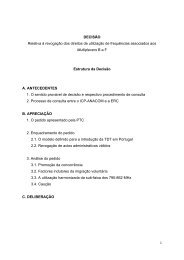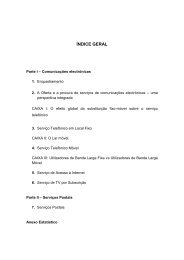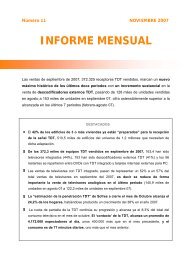- Page 1 and 2:
The Digital Fact BookConverged medi
- Page 3 and 4:
Extract from a letter from Michael
- Page 5 and 6:
Quantel and digital technologyIn 19
- Page 7 and 8:
2003 QColor - powerful in-context c
- Page 9 and 10:
Abbreviationsbit b kilobit kbbits p
- Page 11 and 12:
Digital terms0:2:2See: Dual Link100
- Page 13 and 14:
13.5 MHzThis is the sampling freque
- Page 15 and 16:
3:2 Pull-down (a.k.a. 2:3 Pull-down
- Page 17 and 18:
4:2:0A sampling system used to digi
- Page 19 and 20:
A4KSee Film formats5.1 AudioSee Dis
- Page 21 and 22:
AActive pictureThe area of a TV fra
- Page 23 and 24:
AAliasingUndesirable ‘beating’
- Page 25 and 26:
AArchiveLong-term storage of inform
- Page 27 and 28:
AAspect ratio1. - of pictures. The
- Page 29 and 30:
AAVCHDAdvanced Video Codec High Def
- Page 31 and 32:
BBandwidthThe amount of information
- Page 33 and 34:
BBit (b)Binary digIT = bitOne mathe
- Page 35 and 36:
BBroadbandGeneral term referring to
- Page 37 and 38:
CCamera negative (film)Camera negat
- Page 39 and 40:
CChrominanceThe colorpart of a tele
- Page 41 and 42:
CCOFDMCoded Orthogonal Frequency Di
- Page 43 and 44:
CColor Transform Language (CTL)Colo
- Page 45 and 46:
CCommon Image Format (CIF)The ITU h
- Page 47 and 48:
CCompression ratioThe ratio of the
- Page 49 and 50:
CConsolidationClearing continuous s
- Page 51 and 52:
CCo-sited samplingThis is a samplin
- Page 53 and 54:
DD2A VTR standard for digital compo
- Page 55 and 56:
DatacastingBroadcasting data.See: I
- Page 57 and 58:
DefragmentationSee FragmentationDDe
- Page 59 and 60:
DensityThe density (D) of a film is
- Page 61 and 62:
Digital BetacamSee: BetacamDDigital
- Page 63 and 64:
DDigital keying and chroma keyingDi
- Page 65 and 66: DD-ILADigital Direct Drive Image Li
- Page 67 and 68: DDitherIn digital television, analo
- Page 69 and 70: DDMD(Texas Instruments Inc.) Digita
- Page 71 and 72: DDown-resDecreasing the size of vid
- Page 73 and 74: DDual linkThe bandwidth of SDI and
- Page 75 and 76: DDVBDigitalVideo Broadcasting,the g
- Page 77 and 78: DTo maximize quality and playing ti
- Page 79 and 80: DDynamic Rounding ®Dynamic Roundin
- Page 81 and 82: EElectronic program guides (EPG)DTV
- Page 83 and 84: EEthernetEthernet is a form of Loca
- Page 85 and 86: Fibre Channel (FC)An integrated set
- Page 87 and 88: Format Width mm Height mmFull Frame
- Page 89 and 90: Flash - double and tripleDouble fla
- Page 91 and 92: FFrame-rate conversionThe process o
- Page 93 and 94: Generation lossThe signal degradati
- Page 95 and 96: Grading (a.k.a. color timing)Gradin
- Page 97 and 98: H.264See: MPEG-4HANAHigh-Definition
- Page 99 and 100: HDShort for HDTV.HHDCAMAssigned D11
- Page 101 and 102: HDR, HDRIHigh Dynamic Range Imaging
- Page 103 and 104: HIPPIHigh performance parallel inte
- Page 105 and 106: HVDHolographic versatile disk - a
- Page 107 and 108: I-frame only (a.k.a. I-only)A video
- Page 109 and 110: Inter-frame (compression)Compressio
- Page 111 and 112: Interpolation (spatial)Defining the
- Page 113 and 114: IP over DVBThe delivery of IP data
- Page 115: ITU-R BT.601This standard defines t
- Page 119 and 120: Latency (of data)The delay between
- Page 121 and 122: Linear (keying)In linear keying the
- Page 123 and 124: MasterThe master of an edited progr
- Page 125 and 126: MoiréRefers to a distortion that a
- Page 127 and 128: MPEG-2ISO/IEC 13818. A family of in
- Page 129 and 130: MPEG-4ISO/IEC 14496. MPEG-4 covers
- Page 131 and 132: MPEG-21Started in June 2001, workon
- Page 133 and 134: MXFThe Material eXchange Format, SM
- Page 135 and 136: Non drop-frame timecodeTimecode tha
- Page 137 and 138: Offline (editing)A decision-making
- Page 139 and 140: Over samplingSampling information a
- Page 141 and 142: PerfShort for perforations. It is a
- Page 143 and 144: Progressive (scan)Method of scannin
- Page 145 and 146: RAIDRedundant Array of Independent
- Page 147 and 148: Resolution co-existenceTerm coined
- Page 149 and 150: RS 422Not to be confused with 4:2:2
- Page 151 and 152: However, in practice it can be diff
- Page 153 and 154: SDKSoftware Developers Kit. Typical
- Page 155 and 156: Server (file)A storage system that
- Page 157 and 158: SNMPSimple Network Management Proto
- Page 159 and 160: StEMStandard Evaluation Material wa
- Page 161 and 162: StopA ratio of amount of light wher
- Page 163 and 164: 2K and 4K2K is a format used in dig
- Page 165 and 166: Sub-pixelA spatial resolution small
- Page 167 and 168:
Table 3 (ATSC)Table 3 of the ATSC D
- Page 169 and 170:
Technical gradeA technical grade is
- Page 171 and 172:
True random accessQuantel term for
- Page 173 and 174:
UnicodeUnicode allows computers to
- Page 175 and 176:
VC-1VC-1 is a video codec specifica
- Page 177 and 178:
VersioningIn recent times demand fo
- Page 179 and 180:
VSBVestigial Sideband modulation -
- Page 181 and 182:
Windows MediaAudio and video compre
- Page 183 and 184:
Y, Cr, CbThe digital luminance and
- Page 185 and 186:
‘601’ describes sampling at sta
- Page 187 and 188:
Sampling (clock) frequencyThe (cloc
- Page 189 and 190:
Perfect results?Today the whole ana
- Page 191 and 192:
CameraCamera negativesRush prints v
- Page 193 and 194:
White paper - Stereoscopic 3D postS
- Page 195 and 196:
As well as these problems, there ar
- Page 197 and 198:
Finally, the most important require
- Page 199 and 200:
Standards onlineEBU offers many doc
- Page 201 and 202:
DirectoryAESThe Audio Engineering S
- Page 203 and 204:
Quantel contacts and addressesUKQua
- Page 205 and 206:
Compass, Enterprise sQ, eQ, FrameMa







